Can You Clean Bathroom Tiles With Bleach? Well...
Author: Anne Cowart | Editor: Omar Alonso
Review & Research: Jen Worst & Chris Miller
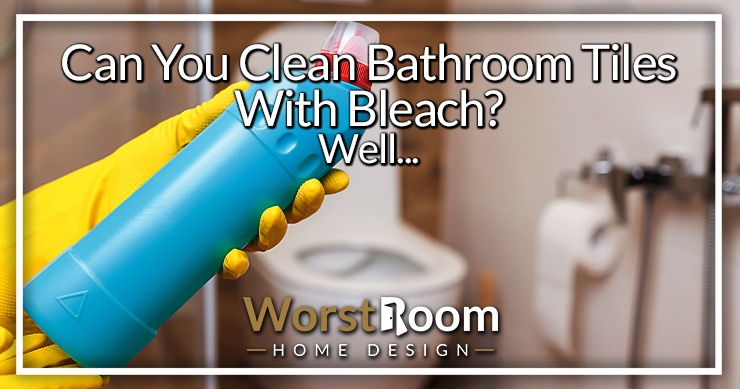
Are your bathroom tiles and grout looking grimy? You might be wondering if you can blast them clean using the power of bleach. After all, it works well in the kitchen, so why can't you use it in the bathroom? Can you clean bathroom tiles with bleach?
Before you grab the bleach bottle, take a second to consider what you're planning. Bleach is a powerful cleaner, but it might not be the best choice for your tiles and grout. Bleach is caustic, and it might damage the grout between the tiles.
This post looks at why bleach is the last thing you should use to clean your bathroom tiles, and other products offer you a better solution for the task.
Does Bleach Damage My Bathroom Tiling?
Will bleach damage ceramic tile? Most manufacturing brands form tiles from coated ceramics fired in a kiln to a hardened finish. Since bleach is an acidic cleaner, it might slowly eat away the protective finish on your tiles over time, leaving them brittle. If you've painted your bathroom tiles, it will dry out and leave the paint brittle too, which will undoubtedly flake.
If you feel you absolutely must use bleach, then consider diluting it more than you’d expect to otherwise. Bleach is effective at taking out mold and the discoloration that comes along with it. But for the sake of your tile, grout, and nose, diluting this cleaning solution is in your best interest. Harsh chemicals like bleach are one of the leading causes of grout deterioration.
Does Bleach Damage Grout?
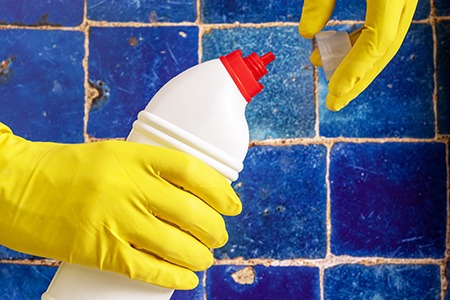
Is bleach bad for grout? The grout holding your tiles in place is porous, and the bleach leeches into the pores in the material, slowly eroding it away. Eventually, you'll find pieces of grout coming loose when you mop the bathroom floor or are showering and are looking at the tile walls. This also means your grout is no longer waterproof, which is a huge problem, and since you can and do tile over drywall, this could mean rotting out the drywall.
You’ll discover you’re having a hard time getting rid of the bleach smell after cleaning, too, since it can soak into porous surfaces. Sure, your grout should be sealed, but over time, as we’ve all experienced, that sealant wears down. Dilution can help reduce the impact of cleaning grout with bleach.
What Cleaners are Safe to Use on Bathroom Tiles & Grout?
Okay, so can you clean bathroom tiles with bleach? We are trying to dissuade you from doing so due to the damage it causes over time, especially with repeated exposures.
You have plenty of other options for tile and grout-friendly bathroom cleaning products. Look for all-purpose cleaning products that don't contain caustic ingredients, such as Pine-Sol or Fabuloso. These ammonia-based cleaners don't contain bleach and won't damage your tiles or grout.
These cleaners won't stain the grout, drying to its original color. As a bonus, these cleaners come in various scents, leaving your bathroom smelling amazing. You won't have to worry about the sterile stench of bleach filling your home after cleaning the bathroom.
Whatever you do though, never mix Fabuloso with bleach, or any other ammonia-based product with bleach like Pine-Sol. Or hot water for that matter, which we'll discuss below.
These all-purpose cleaners effectively remove the grime on your tiles and grout without any adverse effects, leaving them in great condition. We also like bio-enzyme products. These cleaners are a bit more expensive but worth the extra money.
The enzymes in the cleaning formula eat away the grime without damaging the tiles or grout. They're effective at breaking down tough grime and killing mold and mildew.
Best Practices for Cleaning Tile Grout
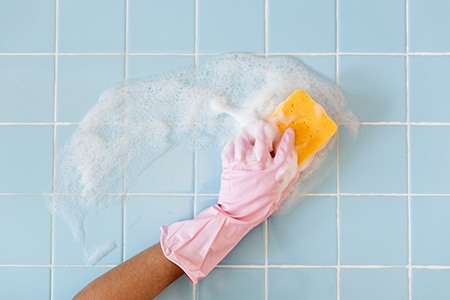
What you don’t want to do is assume you understand everything about cleaning bathroom grout and just go at it. There’s a few little things you should know first.
Wear Gloves
Cleaning the bathroom tiles and grout is hard on the hand, even when you're not using bleach. It's a good idea to wear rubber kitchen gloves to prevent your skin from drying out and stop damaging your hands on the hard tiling if you're scrubbing out stubborn grime from between the tiles. Ensure you have the bathroom window and door open to get as much fresh air into the room as possible to reduce fumes and speed up drying times.
Follow the Tile Cleaners Instructions
Always follow the manufacturer's instructions, especially when diluting the product, whether you're using an all-purpose or enzymatic tile cleaner. Using too much cleaner leaves streaks and a sticky residue on the tile walls and floor. Too little won't provide the expected results, leaving toughened grime on the tiles and grout.
Loosen Dirt & Grime
Start by mopping the floor and wiping the walls with a diluted tile cleaner solution. This action loosens the tough grime and gets rid of surface dust. Next, take a soft-bristled brush and lightly scrub the grout to remove any stubborn dirt. Finish by mopping the floor with hot water. Dry any pooled water with a towel, and leave it to dry.
Cleaning Alternatives for Scrubbing Bathroom Tiles & Grout
Can you clean bathroom tiles with bleach? We're saying not to, and thankfully there’s a lot of “trade secrets” for lack of a better word that people have discovered when it comes to cleaning all types of tile and grout in the home. Here’s a couple of these “hacks” you’ll find interesting.
Try a Magic Eraser on Tile Grout
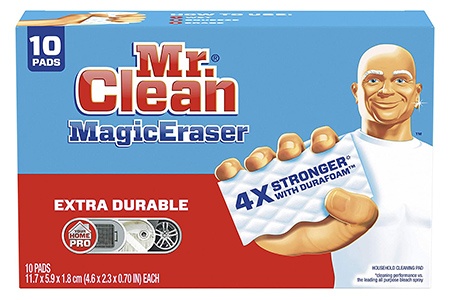
The Magic Eraser is a fantastic cleaning tool for around the home, and you can also use it on grout. Wet the Magic Eraser and squeeze the applicator until it starts to foam. Scrub the tiles and grout, and it instantly lifts tough grime.
Try Toothpaste on Tile Grout
It might surprise you that you can use toothpaste to clean the tile grout in your bathroom. We recommend using white toothpaste, not the gel variety. Add some to an old toothbrush and work it into the grout.
Wipe it away with a damp cloth and leave it to dry. While toothpaste works, it's not the best economical choice, and using all-purpose cleaners or the Magic Eraser is a more pragmatic and affordable option.
How Do Professionals Clean Tile Grout Properly?
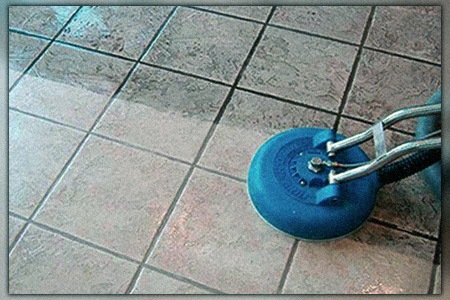
If you move into a new house or apartment, consider hiring a professional cleaning service to spring-clean the tiles and grout. Professionals have the equipment and cleaning products necessary to leave your bathroom tiles looking great, with lasting results.
Here's how professionals clean your bathroom. Maybe you can pick up some tips to add to your cleaning routine, and you should, especially if you have a wet room bathroom.
Proper Surface Preparation & Cleaning
If you look at how professionals clean tiles in the bathroom, they start with vacuuming up the loose dirt on the surface. Then they mop the floor using a commercial-grade, non-caustic cleaner to remove as much dirt and grime as possible.
The next step is to steam clean the floors. This action lifts the grime and dirt soaked into the grout between the tiles, and around fixtures, without damaging it. They finish by drying the surface to ensure it's clean.
Use Professional Cleaning Products
If professionals encounter stubborn grime and dirt on the tiles and grout, they'll use a commercial-grade cleaning solvent to remove them. Typically, these products are acid-free, so they don't absorb into the grout and cause it to erode.
Reseal the Tile Grout
After professionals finish the cleaning and the grout is dry, they'll reseal the tiles. If they don't reseal the surface, it absorbs water, dirt, and grime. The sealing process provides an extra layer of protection to the grout for a longer-lasting effect that's stain resistant.
Can I Use Bleach to Kill Black Mold on Shower Tiles?
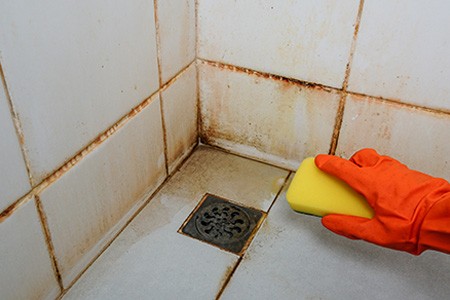
Removing shower mold is challenging, but eliminating black mold from the shower feels like an impossible task. Black mold is a dangerous pathogen that releases spores into the air that enter your lungs, causing respiratory illnesses like pneumonia and damage to the nervous system.
Black mold likes growing on porous surfaces with plenty of moisture around. So, the shower is the ideal environment for the spread of this dangerous pathogen. If it gets into the pores between the shower tiles, it's very hard to remove. Not only is it a health risk, but it also looks unsightly.
You might think of using bleach to kill the mold, but it probably won't work completely. It takes care of surface mold, but the viscosity of bleach means its unable to effectively penetrate the tiny pores in the grout where the mold microflora grow. Another reason you don't want to use bleach to clean shower tiles is that you could make a dangerous mistake.
After attempting to clean the shower tiles with bleach, you might decide to use the hot water from the shower to rinse the cleaned area. When bleach comes in contact with hot water, the reaction causes the production of lethal chlorine gas. Please never use bleach with hot water. So once again, can you clean bathroom tiles with bleach? You're better off not doing so.
How Long Should I Leave Bleach on Bathroom & Shower Tiles?
If you decide to clean your shower or bathroom with bleach, use a diluted solution. Add ¼ cup bleach to one bucket of room temperature water. Open the shower door, the windows, and the bathroom door and start scrubbing out the shower.
Leave the bleach to work on the surface for ten to 15 minutes max. Rinse it away using cold water. Don't use undiluted bleach for the task. Most bleach products are very thick and sticky without dilution first. That means it takes a lot of scrubbing to wash it away. If you have shower tile alternatives up, make sure you investigate how long each material can handle bleach sitting on it.
It's best to avoid using bleach in the bathroom because it's somewhat of a confined space. This caustic agent is harsh on your lungs, throat, sinuses, and eyes. Breathing in too much of the fumes could cause you to pass out.
Key Takeaways Regarding Cleaning Tiles With Bleach
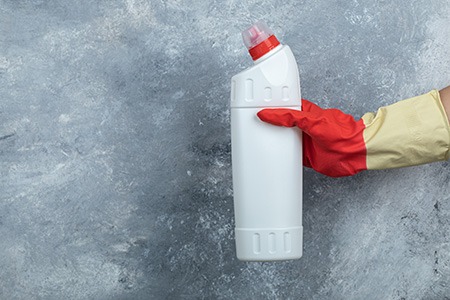
Let’s do a quick recap of everything we covered above to re-emphasize the main points:
- Can you use bleach on tile and grout? You should avoid it when possible.
- The bleach could remove the protective layer from your tiles, leaving them brittle.
- The bleach also removes the sealant from the grout, seeping into it where it erodes it and turning it brittle.
- It's a better choice to use all-purpose cleaners for the task or specialized cleaning products like the Magic Eraser.
- Hire a professional cleaning team to clean the bathroom if you move into a new home or apartment.
- Don't use bleach to clean the shower of black mold if you can avoid it.
- Never rinse bleach away with hot water or mix it into hot water. This action produces lethal chlorine gas.
- Ensure you use bleach in a well-ventilated environment.
Bleach creates a nice, clean visual appearance but the additional problems it brings into the picture isn’t worth it.
So, Can You Clean Bathroom Tiles With Bleach?
There are plenty of other cleaning products you can use other than bleach that contain all of the benefits and few of the problems. Bleach may help hide the discoloration mold creates but it’ll cause more problems that you’ll be dealing with in the future if you do. Can you clean bathroom tiles with bleach? Yes, but we recommend against it.




